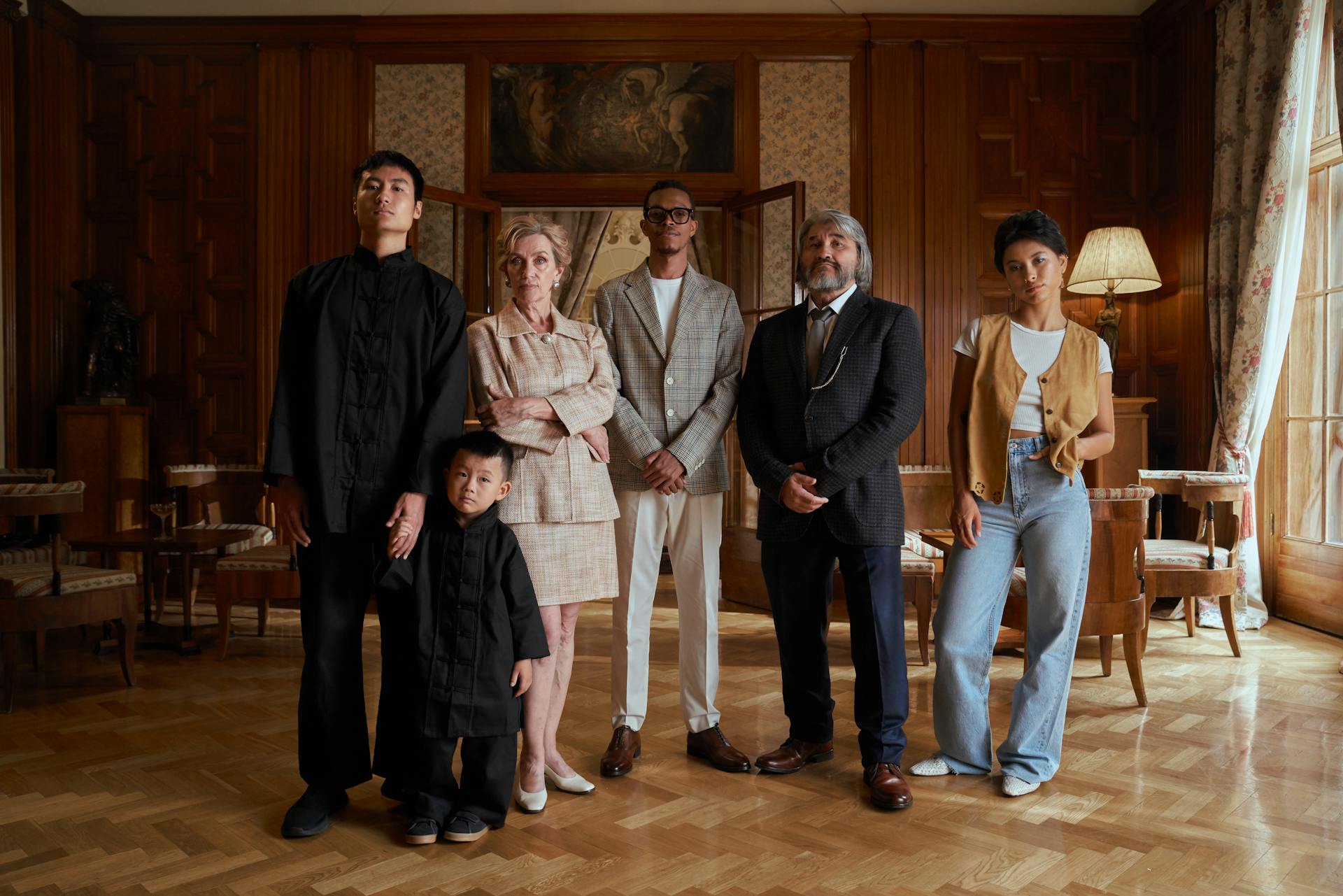
Ray Dalio's new book offers a unique perspective on navigating uncertain times. His book provides guidance on how to think about the future and make decisions that will serve us well.
One key takeaway from the book is the importance of being open to new information and ideas. Dalio emphasizes the need to be a "radical learner", always seeking to learn and improve.
In uncertain times, it's easy to get caught up in emotions and make impulsive decisions. But Dalio's book shows us how to cultivate a more objective mindset and make decisions based on data and evidence.
Dalio's own experiences as a hedge fund manager have taught him the value of staying calm and focused, even in the face of uncertainty.
Book Information
Ray Dalio's new book, "The Changing World Order", explores the concept of a cyclical pattern known as the "big cycle." This cycle has been observed in history, where a major conflict establishes a new leading power and world order.
The book identifies three key events that occur together, often leading to a changing world order: countries struggling to pay their debts, growing internal conflicts, and increasing external conflicts between rising and leading great powers.
The "big cycle" typically begins after a major conflict, such as a war, which establishes the new leading power and world order. For example, the US rose to become the world's superpower after World War II.
The cycle progresses through four stages: the emergence of a new dominant power, the establishment of a new monetary system, the growth of the empire's share of trade, and the eventual bursting of a financial bubble.
Here's a breakdown of the stages:
- Emergence of a new dominant power: A major conflict establishes the new leading power and world order.
- Establishment of a new monetary system: The new dominant power builds and refines its resource-allocation systems and governments.
- Growth of the empire's share of trade: The new dominant power's prosperity distributes wealth unevenly, leading to a growing wealth gap between the rich and poor.
- Financial bubble: The increased prosperity leads to borrowing and a financial bubble, which eventually bursts.
As Dalio observed in history, these same cause-and-effect relationships drove the rises and declines of empires all the way back to the Roman empire.
Why to Read It?
This book is a great resource if you want to understand markets and study macroeconomics. It's based on a 30-minute animated YouTube video that Ray Dalio released in 2012.
The book explains how the world economy is headed by combining graphic representations of the short-term debt cycle, long-term debt cycle, and productivity growth.
Ray Dalio has already made the information in the book available in a 43-minute animated video, which is definitely worth watching.
If you want to know what's going on in global markets and why we have certain geopolitical tensions right now, this book is a great place to start.
Book Details
Ray Dalio's new book, "Principles for Dealing with the Changing World Order", draws from fifty years of research on international economies and markets.
The book is a follow-up to his previous book, "Principles", which outlined his personal story and the principles he's learned throughout his career in finance.
Dalio's new book explores the "Big Cycle" that drives the successes and failures of major empires, including the Dutch, British, and American empires.
The book is divided into three parts, with Dalio providing insights into ageless and global forces of change, as well as guidelines for preparing for what lies ahead.
Here are some key takeaways from the book:
- Cycles of History: Dalio highlights that history follows cycles, including long-term financial debt, economic, and governmental cycles.
- The Power of a Universal Framework: Dalio asserts that using a universal set of principles helps individuals and leaders navigate the complexities of a changing world order.
- Wealth and Power Shifts: The book explores the shift of wealth and power among nations, focusing on the rise of China and the potential decline of the United States as the world's dominant economic power.
- The Importance of Adaptability: In a constantly changing world, adaptability is crucial for both individuals and countries.
- Investing in a Changing World: Dalio gives strategic advice for investors aiming to protect and grow their wealth amid geopolitical and economic changes.
Book Summary
Ray Dalio's books offer a wealth of knowledge on economics, finance, and personal development. His most popular book, Principles: Life and Work, has over 12,200 Amazon ratings and explores his personal story, the principles for living a good life, and the lessons he's learned through much pain and reflection.
Dalio's books are known for their accessibility and practicality, making them a great resource for anyone looking to improve their understanding of economics and finance. His book Principles for Dealing with the Changing World Order explores the cyclical pattern of empires rising and falling, and how nations can navigate this cycle to achieve success.
The book is divided into three parts: the first part explains how the world works and how nations become successful, the second part provides case studies of the Dutch, British, and US empires, and the third part looks at the future, particularly with regards to China's rise as a global power. Dalio's insights into the "Big Cycle" driving the successes and failures of major empires are particularly valuable.
Here are some key takeaways from Dalio's books:
- Cycles of history: Dalio highlights that history follows cycles, including long-term financial debt, economic, and governmental cycles.
- The power of a universal framework: Dalio asserts that using a universal set of principles helps individuals and leaders navigate the complexities of a changing world order.
- Wealth and power shifts: The book explores the shift of wealth and power among nations, focusing on the rise of China and the potential decline of the United States as the world's dominant economic power.
- The importance of adaptability: Dalio suggests that those who can quickly adjust to new environments are more likely to succeed.
Dalio's books offer a unique perspective on the world and its complexities, making them a valuable resource for anyone looking to improve their understanding of economics, finance, and personal development.
Reading Book Order
Reading Ray Dalio's books in the right order can make a big difference in how much you get out of them. The order is not random, but rather it's based on the topics and complexity of the books.
Start with the most accessible book, "Principles for Success", which was written for Ray's grandchildren. This book is a great introduction to his principles and is easy to understand.
Ray's seminal book, "Principles", is a long but skimmable read that will improve your decision-making and work relationships. It's a good idea to read it after "Principles for Success" to build on the concepts you've already learned.
If you're interested in Ray's insights on money, finance, and the economy, start with "Economic Principles" to understand the basics of how markets, transactions, productivity, and global interrelations work.

Here's a suggested reading order:
- Principles for Success
- Principles
- Principles: Your Guided Journal
- Economic Principles
- Principles for Navigating Big Debt Crises
- Principles for Dealing with the Changing World Order
Reading Ray Dalio's books in this order will give you a solid foundation in his principles and help you understand the economy and the world around you.
Reviews and Ratings
Ray Dalio's new book has received widespread attention and praise from readers and critics alike.
The book has an average rating of 4.5 out of 5 stars on Amazon, with many reviewers praising Dalio's unique approach to investing and personal development.
One reviewer noted that the book's emphasis on radical transparency and openness to new ideas was particularly valuable.
The book has also been praised for its accessibility and practicality, making it a valuable resource for readers from a variety of backgrounds.
Many readers have reported applying the principles outlined in the book to their own lives, with positive results.
The book's focus on developing a "machine" for making decisions has been particularly influential, with many readers reporting improved decision-making skills.
Overall, the reviews and ratings of Ray Dalio's new book are overwhelmingly positive, reflecting the book's impact and relevance for readers.
Changing World Order
Ray Dalio's latest book, "The Changing World Order", is a thought-provoking analysis of the rise and fall of major global empires over the last 500 years. He studies the factors that drive shifts in power over time and whether history repeats itself.
Dalio's research reveals that almost every system of government, economic system, currency, and empire has lasted forever, yet almost everyone is surprised and ruined when they fail. This is a crucial insight for anyone trying to navigate the complexities of the global environment.
The book explores how nations become successful through a combination of money, credit, debt, and economic activity while ensuring inner societal order. This is a key takeaway from Dalio's analysis of the Dutch, British, and US empires, including their currencies, and how they became world powers – and then lost that status.
Dalio's book provides a framework for understanding how the world is changing, including the shift of wealth and power among nations, focusing on the rise of China and the potential decline of the United States as the world's dominant economic power. He offers insights into how nations can manage these transitions peacefully.
The book also highlights the importance of adaptability in a constantly changing world. Dalio suggests that those who can quickly adjust to new environments are more likely to succeed. This is a valuable lesson for individuals and countries alike.
Dalio's book is a timely addition to his Principles series, offering guidelines for preparing for what lies ahead. By recognizing the patterns of history and understanding the cause-and-effect nature of economic and governmental movements, individuals and leaders can make informed decisions and navigate the complexities of the changing world order.
Author Information
Ray Dalio is a renowned American billionaire investor and the founder of Bridgewater Associates, the world's largest hedge fund.
He has spent decades developing a unique investment philosophy and has written extensively on the subject.
Ray Dalio has been named one of the 100 most influential people in the world by Time magazine.
His latest book provides insights into his investment approach and philosophy.
Ray Dalio is also the founder of the Principles, a framework for making decisions and achieving success.
He has been open about his personal struggles and how they have influenced his investment decisions.
Ray Dalio is a strong advocate for radical transparency and open communication in business and personal relationships.
His book offers practical advice on how to apply these principles in everyday life.
Ray Dalio has been named one of the greatest investors of all time by Bloomberg.
Sources
- https://fourminutebooks.com/ray-dalio-books/
- https://www.thefastlaneforum.com/community/threads/ray-dalios-changing-world-order-thoughts.102517/
- https://parents.simonandschuster.com/9781982160272
- https://www.theinvestorspodcast.com/articles/changing-world-order/
- https://arvy.ch/principles-for-dealing-with-the-changing-world-order-by-ray-dalio/
Featured Images: pexels.com


